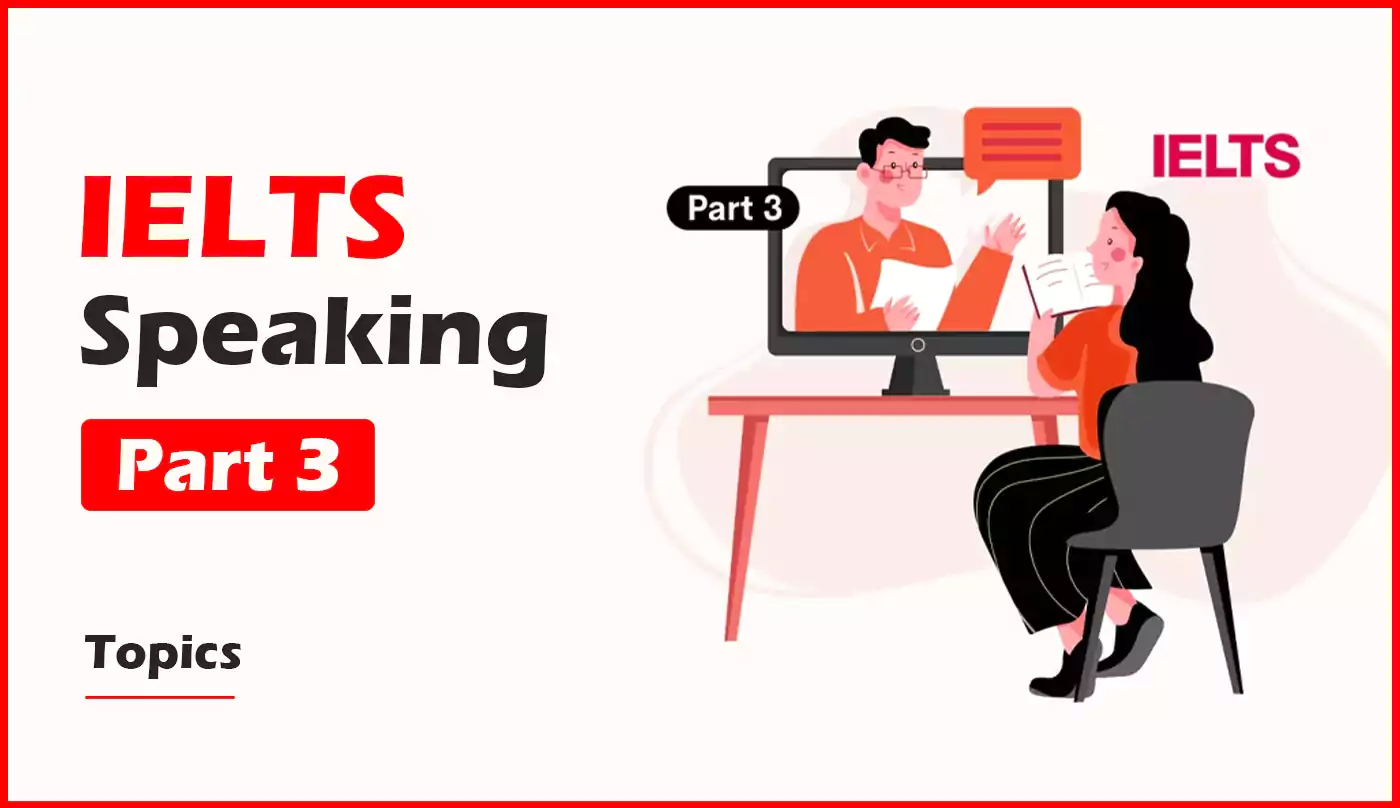• IELTS
IELTS speaking part 3 topics
3349 Reads
3 min Read
The IELTS Speaking Part 3 is mostly the longest part of the IELTS speaking exam, and here in this blog, you will find some techniques, examples and suggestions to excel in the Speaking test. Notice that if you follow a format to express, you can organize your thoughts properly.

IELTS has four components on which a candidate is marked: Writing, Listening, Reading and Speaking. The IELTS speaking consists of an 11 to 20-minute long interview, and this interview is divided into three sections, and this format is standard for Academic and General IELTS speaking.
The three sections of IELTS speaking part 3
PART 1: This part contains a bunch of general/ introductory questions to be answered in at least two sentences each.
PART 2: The second part is an extempore where you will get a topic to prepare, and the preparation time is one minute, whereas the speaking time is about 2 minutes.
PART 3: The final part of the test or the follow-up questions are entirely based on the topic you get in the second part. It takes about 4-5 minutes to have a two-way conversation with the examiner for IELTS Speaking Part 3.
In this article, you will come across ways to tackle questions in the third part of the interview, along with some examples to help you understand the format.
| Work | Study | Hometown |
| Home | Reading | Birthdays |
| Hobbies | Clothes | Shopping |
| Computers | Dictionaries | Evenings |
| Neighbours & neighbourhoods | Flowers | Going out |
| Happiness | Childhood | Internet |
| Leisure time | Music | Family friends |
| Newspapers | Pets | Art |
| Daily routine | Sport | Television |
| Transport | Weather | --- |
Also read : What is IELTS?
In the third section, you will have a lengthy discussion with an examiner for roughly 4-5 minutes, during which you will be questioned on a broader range of subjects related to those covered in part 2. The examiner will carefully evaluate your capacity for logical thought, articulation, and speaking.
1. You must appear interested and listen to the questions carefully before answering them: Sit straight and be attentive.
2. Each answer must have a clear motive and opinion if the question is opinion-based: Usually, questions are opinion based, and there are no extra marks for having a balanced opinion; therefore, justify and elaborate upon one side properly.
3. You should elaborate on these answers, so use examples wherever possible: Examples can help you elaborate in detail. Moreover, examples can be beneficial if you have limited reasons to justify.
4. Appropriate vocabulary that is topic-specific should be used: Each question's topic or theme will have a different set of words that you can use. For example, if the topic is business-related, then words like inflation, profit and loss should be used, which are directly related to the topic.
5. Base your practice on as many topics as you can cover before the final test: Each day, take up a new theme or topic and work on justifications, vocabulary and examples for the same.
Try to use the following as your format for each answer
Also read : IELTS Eligibility
IELTS Speaking Part 3 - Questions and Topics
The IELTS speaking practice questions listed below are grouped into many subject areas. However, remember that the test could cover many subjects and questions.
Eating habits
Education
Environment
Also read : IELTS Exam type
Influence of Television
Influence on the young
Leisure activities
Also read : IELTS Exam dates
Shopping
Sports
Transport
Also read : IELTS test centres
FAQ
Get great articles direct to your inbox
The latest news, articles, and resources, sent straight to your inbox every month.
Popular Universities to Study Abroad
World class education waiting for you.

The University of Waikato - Hamilton Campus
Hamilton, New Zealand • 354 Programmes
Tuition Fee : NZD 25900-38960 / year


North Island College - Comox Valley Campus
British Columbia, Canada • 39 Programmes
Tuition Fee : CAD 16000-22500 / year

Management Development Institute of Singapore (MDIS)
Central Region, Singapore • 39 Programmes
Tuition Fee : SGD 0-0 / year

Sprott Shaw College - Surrey College Campus
British Columbia, Canada • 23 Programmes
Tuition Fee : CAD 10000-38000 / year

Mediadesign University of Applied Sciences - Dusseldorf Campus
North Rhine-Westphalia, Germany • 11 Programmes
Tuition Fee : EUR 12600-12600 / year
-Avila-University.webp)
Global University Systems (GUS) - Avila University
Missouri, USA • 56 Programmes
Tuition Fee : USD 37000-38000 / year

Kaplan Group - University of Connecticut - Storrs Campus
Connecticut, USA • 115 Programmes
Tuition Fee : USD 37000-39000 / year
Popular English Language Proficiency Exams
IELTS Online
- Live Classes
Blogs and Articles
Curated content to keep you updated on the latest education trends, news and more.
ACT vs. SAT: Which One to Choose?
Updated on • Apr 12,2025 05:40 PM IST • Study Abroad
Updated on • Apr 11,2025 05:53 PM IST • IELTS
Backlog Certificate: A Complete Guide
Updated on • Apr 11,2025 01:47 PM IST • Study Abroad Guidance
PTE Score Chart 2025: PTE Exam Scoring System & Calculation
Updated on • Apr 09,2025 05:37 PM IST • PTE
Master's in Computer Science in the USA
Updated on • Apr 08,2025 05:59 PM IST • USA
Top Trending MBA Specialisations in 2025
Updated on • Apr 08,2025 04:47 PM IST • Study Abroad
Describe Your Hometown IELTS Speaking Part 1 Topic
Updated on • Apr 07,2025 05:50 PM IST • IELTS
How to Get a Job in USA in 2025
Updated on • Apr 07,2025 03:19 PM IST • USA
Highest Paying Jobs in the World
Updated on • Apr 01,2025 05:31 PM IST • Study Abroad
Student Life in Ireland in 2025
Updated on • Mar 29,2025 05:50 PM IST • Ireland
Top Public Universities in Germany
Updated on • Mar 26,2025 04:33 PM IST • Germany
Top Universities for Masters in Ireland in 2025
Updated on • Mar 25,2025 04:36 PM IST • Ireland
Cost of Living in Singapore for Indian Students in 2025
Updated on • Mar 22,2025 11:57 AM IST • Singapore
PTE vs IELTS : Know the Difference and Which is Easier?
Updated on • Mar 21,2025 03:38 PM IST • IELTS
Updated on • Mar 20,2025 10:19 AM IST • Germany
Updated on • Mar 12,2025 11:20 AM IST • Ireland
Updated on • Mar 11,2025 01:18 PM IST • USA
Best Countries to Study Abroad for Indian Students in 2025
Updated on • Mar 08,2025 01:24 PM IST • Study Abroad
Updated on • Mar 05,2025 12:19 PM IST • UK
Fastest Growing Job Sectors in Germany in 2025
Updated on • Feb 28,2025 04:04 PM IST • Germany
Related Blogs and Articles
A little effort to provide an authentic and reliable content for keen readers!!
Updated on • 11-04-2025 • IELTS
Describe Your Hometown IELTS Speaking Part 1 Topic
Updated on • 07-04-2025 • IELTS
PTE vs IELTS : Know the Difference and Which is Easier?
Updated on • 21-03-2025 • IELTS
IELTS Exam Dates 2025 in India
Updated on • 18-01-2025 • IELTS
IELTS Reading Practice Tests 2025: Reading Passage and Sample Questions
Updated on • 15-01-2025 • IELTS
IELTS Letter Writing Topics 2025
Updated on • 15-01-2025 • IELTS
Canada IELTS band requirements 2025
Updated on • 10-01-2025 • IELTS
Updated on • 25-11-2024 • IELTS
Updated on • 21-11-2024 • IELTS
Updated on • 02-11-2024 • IELTS
Linking Words for IELTS Speaking - Word List & Tips
Updated on • 25-10-2024 • IELTS
IELTS Writing Task 2 - Academic and General Topics with Sample Answer
Updated on • 25-10-2024 • IELTS
IELTS Writing Task 2: Tips, Lessons & Models
Updated on • 25-10-2024 • IELTS
IELTS Test Report Form (TRF): Number, Tracking, Validity and Sample
Updated on • 25-10-2024 • IELTS
IELTS Speaking Samples and Answers
Updated on • 25-10-2024 • IELTS
Updated on • 25-10-2024 • IELTS
IELTS Sample Charts for Writing Task 1 Practice
Updated on • 25-10-2024 • IELTS
IELTS GT Writing Task 1/ IELTS Letter Writing
Updated on • 25-10-2024 • IELTS
Updated on • 25-10-2024 • IELTS
How many times is the IELTS exam conducted in a year?
Updated on • 25-10-2024 • IELTS














